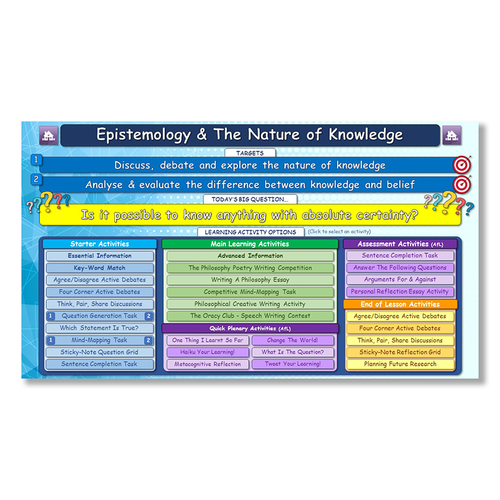












This flexible interactive philosophy lesson focuses on epistemology: the field of philosophy concerned with the nature of knowledge, different potential sources of knowledge, the difference between knowledge and opinion, and the different ways in which beliefs can be evaluated.
The download includes a free bonus resource: a comprehensive teaching pack focused on logical fallacies and critical thinking.
This session is ideal for teachers who want to explore philosophy with students and, aside from referring to more conventional epistemological issues, it also explores to the importance of critical-thinking and how students can detect misinformation online and discern between reliable and unreliable sources of information; we’ve carefully selected the most significant epistemological issues and questions so that young learners can engage in fun philosophical discussions and debates. This session explores topics such as:
- The nature of knowledge
- The difference between knowledge and belief
- Different ways of evaluating knowledge claims
- Intellectual virtues
- Obstacles that arise in the pursuit of truth
This philosophy teaching resource also outlines and explains different epistemological views (such as empiricism, rationalism, fideism and scepticism).
The big question asked in this session is “Is it possible to know anything with absolute certainty?”. Using a variety of engaging activities students will discuss and debate a wide range of other philosophical questions such as:
- To what extent can we rely on the senses as a source of knowledge?
- How do we evaluate the validity of different beliefs? and
- What drives the spread misinformation and how can we detect it?
Students will also analyse and evaluate an eclectic mix of philosophical claims such as:
- “It is impossible to know anything with 100% certainty"
- “We should always be sceptical about what others claim to be true” and
- “One should never believe in something until one has experienced it personally”
This session uses our unique format for philosophy teaching resources and features an integrated menu that allows teachers to select from a variety of starter, main, plenary, assessment and end-of-lesson reflection activities. Aside from a wide range of debate and discussion activities, teachers can also choose from a variety of more substantial activities such as essay writing, poetry writing, and speech writing tasks.
This resource is suitable for teachers of all school subjects who are looking to introduce philosophy, philosophical thinking and critical thinking.
Something went wrong, please try again later.
This resource hasn't been reviewed yet
To ensure quality for our reviews, only customers who have purchased this resource can review it
Report this resourceto let us know if it violates our terms and conditions.
Our customer service team will review your report and will be in touch.